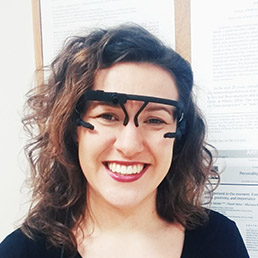Monika Kornacka is an Assistant Professor at the Department of Clinical and Health Psychology at the Faculty of Psychology in Katowice as well as Vice-Director of SWPS University’s Institute of Psychology and Head of the Emotion Cognition Lab. As a doctoral student, she became interested in transdiagnostic processes, in particular rumination, i.e. dwelling on the same problems and issues. She continues this research with her team at the Emotion Cognition Lab, focusing on two parallel paths – firstly on transdiagnostic processes, emotional regulation and psychopathology, and secondly on the use of new technologies in emotion-cognition research.
Currently, the team carries out a research project financed by a research grant from the National Research Center (NCN), which explores rumination in daily life using an ecological momentary assessment. The researchers also employ Virtual Reality (VR) technology in the study as it provides combined benefits of a controlled lab environment and behavior in simulated everyday life functioning.
The Emotion Cognition Lab is a member of the Human Aspects in Science and Engineering (HASE) research group and collaborates with the XR Lab from the Polish-Japanese Academy of Information Technology and the VR Lab of the Polish Academy of Science's Institute of Psychology.
For me the most important part of being a researcher is collaboration. (...) I think it is important to collaborate internationally not only for methodological reasons or to answer a specific research question. For me it is also very important to learn how to manage a research team and what is the role of mentoring from both perspectives – the mentee and the mentor.

Monika Kornacka
Ph.D. / Assistant Professor
Hear Dr. Kornacka speak about:
The use of new technologies in cognitive psychology research
Dr. Kornacka talks about the application of new technologies, such as eye tracking, mobile apps, and VR, in psychological research and her studies on rumination.
Read more about Dr. Kornacka's research
- Task Unrelated Thoughts (TUT) affecting mood in ecological settings: from adaptive mind-wandering to maladaptive rumination.
Kornacka, Monika;Atzeni, Thierry;Krejtz, Izabela;Bortolon, Catherine;Baeyens, Celine, Published in: eScholarship
- Concrete vs. Abstract Processing in Repetitive Negative Thinking: Distinct Functional Effects on Emotional Reactivity and Attentional Control
Monika Kornacka, Izabela Krejtz, and Celine Douilliez, Published in: Frontiers in Psychology
- Participatory Design Landscape for the Human-Machine Collaboration, Interaction and Automation at the Frontiers of HCI (PDL 2021)
Wiesław Kopeć, Cezary Biele, Monika Kornacka, Grzegorz Pochwatko, Anna Jaskulska, Kinga Skorupska, Julia Paluch, Piotr Gago, Barbara Karpowicz, Marcin Niewiński & Rafał Masłyk, Published as part of the lecture notes in: Computer Science book series
- Eye-tracking exploration of inhibitory control in post-traumatic stress disorder: an emotional antisaccade paradigm
Wivine Blekic, Erika Wauthia, Monika Kornacka, Kendra Kandana Arachchige, Laurent Lefebvre & Mandy Rossignol, Published by: European Journal of Psychotraumatology
- All Factors Should Matter! Reference Checklist for Describing Research Conditions in Pursuit of Comparable IVR Experiments
Kinga Skorupska, Daniel Cnotkowski, Julia Paluch, Rafał Masłyk, Anna Jaskulska, Monika Kornacka & Wiesław Kopeć, A conference paper published as part of the Advances in Intelligent Systems and Computing book series
- Dynamic Relation Between Repetitive Negative Thinking and Inhibition in Depression
Research project